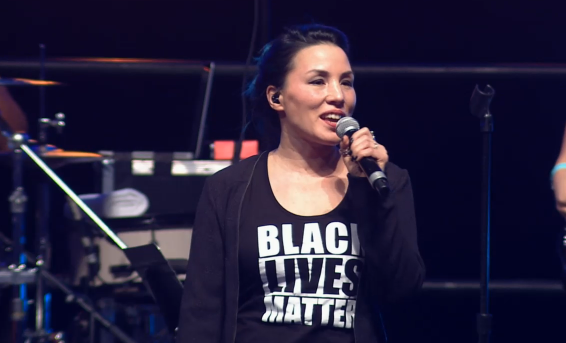(RNS) InterVarsity Christian Fellowship is an evangelical college ministry that is no stranger to social justice movements. Still, it took a bold step when, at its yearly student missions conference, which concludes Thursday (Dec. 31), the group issued a full-throated, unapologetic call to support #BlackLivesMatter.
What InterVarsity did was more than a nod to current events or the need to oppose racism.
In the U.S., there are just over 41,000 college students involved in InterVarsity chapters. Since the 1940s, InterVarsity’s Urbana missions conference has brought together thousands of its students for four days of seminars, worship services and meetings.
While the name of the conference still refers its longtime location at the University of Illinois, the conference is now located in St. Louis.
READ: Why this may be the final week I watch football, and why Americans should quit it, too (COMMENTARY)
The location is 13 miles from Ferguson. Given that, InterVarsity’s commitment to both social justice and the diversity of its students (more than a third are ethnic or racial minorities), it was not surprising that there was some mention of racial inequality. But InterVarsity went further.
The first sign was the worship team. Its members wore Black Lives Matter T-shirts and sang gospel songs.
Then Michelle Higgins took to the stage. Higgins directs Faith for Justice, a Christian advocacy group in St. Louis (she also serves as worship director at South City Church).
She’s active in the #BlackLivesMatter movement in the St. Louis area, and she challenged the students to listen to the stories of the movement and get involved.
She noted that Christians have been willing to be political and activist on issues such as abortion, but not on issues such as racism and inequality that are more uncomfortable to address.
READ: Americans prize religious freedom for Christians — less for Muslims or atheists
Higgins did more than promote a message that racism is sinful. She placed support of #BlackLivesMatter squarely in the mission of God.
“Black Lives Matter is not a mission of hate. It is not a mission to bring about incredible anti-Christian values and reforms to the world,” Higgins said. “Black Lives Matter is a movement on mission in the truth of God.”
Higgins concluded by leading the students with the #BlackLivesMatter chant: “I believe that we will win!” She used the chant as a call and response, a show of the students’ faith in God.
InterVarsity’s move to embrace #BlackLivesMatters is the ministry’s boldest statement on race relations, but it is one that builds on decades of multiethnic and multiracial work.
InterVarsity began the 1940s as an integrated ministry that officially rejected racism. After a couple of hundred black students at the 1967 Urbana meeting called for further action by InterVarsity, the organization made reforms.
One of the responses by InterVarsity was to invite Tom Skinner (1942-1994) to Urbana ’70. Skinner’s sermon laying out the history of racism in America and evangelical churches’ complicity still resonates within InterVarsity.
Skinner told the students at Urbana ’70 that during segregation, “the evangelical, Bible-believing, fundamental, orthodox, conservative church in this country was strangely silent.” The churches, Skinner said, supported the status quo on slavery, segregation and civil rights.
While Skinner’s message is important in the history of InterVarsity and evangelicalism, it is noteworthy because it came after the early battles of the civil rights movement. During the 1950s and 1960s, evangelicals, even when they opposed segregation, stayed clear of joining the civil rights movement.
This week’s support for #BlackLivesMatter is different because InterVarsity is embracing a social and political movement that is active. And it is one that is controversial both nationally and within evangelicalism.
While InterVarsity has long championed evangelism and social justice, linking the two in one mission could be a watershed moment in American evangelicalism.
(Tobin Grant blogs for RNS at Corner of Church and State. He is a political science professor at Southern Illinois University and associate editor of the Journal for the Scientific Study of Religion. Follow him @TobinGrant)





